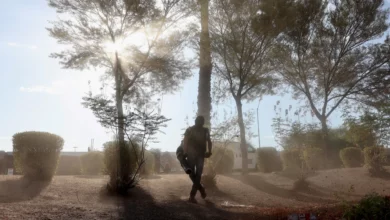
The world's tropical forests are less likely to lose biomass, or plant material, this century due to the effects of global warming than previously thought, scientists said in a paper published in the journal Nature Geoscience on Sunday.
This adds to growing evidence that rainforests might be more resilient to the effects of climate change than feared.
Tropical forests play an important role in the world's climate system because they soak up carbon dioxide and use it to grow leaves, branches and roots.
It is estimated that they store around 470 billion metric tons (518.09 billion tons) of carbon in their biomass and soil, some of which can be released back into the atmosphere when plants rot or get burnt.
Rising global temperatures cause droughts and fires, which can kill trees, but estimates vary on how much forest cover would be lost in a warming world.
In 2009, a group of British scientists said that 20 to 40 percent of the Amazon could die off within 100 years if global temperatures rose by 2 degrees Celsius and 85 percent would be lost if temperatures rose by 4 degrees, which is seen as increasingly likely.
But a study last month said the Amazon rainforest was less vulnerable to dying off because carbon dioxide also acts as an airborne fertilizer.
In this study, scientists and tropical ecologists from Britain, the United States, Australia and Brazil used computer simulations based on 22 climate models to study the response of tropical forests in the Americas, Africa and Asia to rising global temperatures.
The research team found forest cover loss in only one model, in the Americas (Amazonia and Central America).
"We conclude that … there is evidence of forest resilience for the Americas, Africa and Asia," said lead author Chris Huntingford, from Britain's Centre for Ecology and Hydrology.
However, there are still uncertainties in gauging how ecosystems respond to global warming, the study said.
"While these new results suggest that tropical forests may be quite resilient to warming, it is important also to remember that other factors not included in this study, such as fire and deforestation, will also affect the carbon stored in tropical forests," said co-author David Galbraith from the University of Leeds.
The impacts of these factors are difficult to gauge so further study is needed, he added.
Deforestation derives from human activity and can aggravate the effects of climate change by releasing more carbon into the atmosphere.
Brazil has sharply reduced forest losses in recent years. But predictions of a die-back in coming decades had led some people to conclude that there was no point safeguarding trees.




